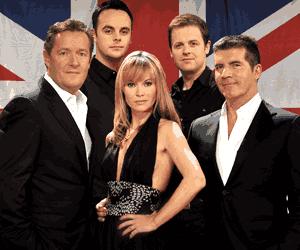Britain's Got Talent
Contents |
Host
Paul O'Grady (non-broadcast pilot)
Co-hosts
Judges:
Fern Britton (non-broadcast pilot)
Amanda Holden (all series)
Simon Cowell (all series, live shows only 2011)
Piers Morgan (2007-10)
Kelly Brook (early auditions, 2009)
Louis Walsh (stand-in judge, 2010-1)
Michael McIntyre (2011)
David Hasselhoff (2011)
Alesha Dixon (2012-)
David Walliams (2012-)
Gary Barlow (stand-in judge, 2013)
ITV2 coverage (Britain's Got More Talent): Stephen Mulhern
Announcer: Peter Dickson
Broadcast
TalkbackThames and Syco for ITV1/2, 9 June 2007 to 4 June 2011 (61 episodes in 5 series)
Thames and Syco for ITV1/2, 24 March 2012 to present
Synopsis
A search for a talented performer, with the prize of an appearance at the Royal Variety Performance and £100,000 (upped to £500,000 for the sixth series, and downed to £250,000 the following year).
Simon Cowell leads a team of light-entertainment deities (and former tabloid editor Piers Morgan) around the country in search of fine talent. Unlike every other talent contest ever, the performer need not be a singer. Dancers, ventriloquists, clowns, people who play the spoons, people who carve sculptures out of ice are all welcome to audition.
The key gimmick here was that each judge was issued a large X, linked to a buzzer. When the judge had had enough of the performance, they pressed their buzzer, and their X lit up. If all three (later four) judges buzzed in, the act was entertaining no-one, and terminated. Any resemblance to the gimmick of Let Me Entertain You is surely a coincidence.
The first half of the series followed the usual route of showing people who were either very competent or very poor at what they did. The latter stages returned to a more traditional studio setting, with a week of live semi-finals, and a public phone-in to determine who advances to the final. In each semi-final, the act receiving the most public votes is automatically through to the final. Which act progresses from the two which polled in second and third place lies with the judges. At the end of the week, the judges collectively also pick one act from those who did not progress from the semi-finals to appear in the final as a wildcard entry.
Other than occasional changes in judging personnel, the programme has remained largely the same year to year. One notable change however was the introduction from the 2014 series of the Golden Buzzer. Each judge, and hosts Ant & Dec, can press the Golden Buzzer, situated centrally on the judges desk, just once during the theatre auditions stage. Any act receiving the Golden Buzzer is automatically put straight through to one of the live semi-finals, immaterial of whether the other judges agree or not. The 2015 series also added a second wildcard act to the final, which viewers chose from the five acts who were in the top three in their respective semi-finals, but did not progress.
Champions
2007: Paul Potts (opera singer)
2008: George Sampson (dancer)
2009: Diversity (dance troupe)
2010: Spelbound (gymnastics troupe)
2011: Jai McDowall (singer)
2012: Ashleigh and Pudsey (performing dog act)
2013: Attraction (shadow theatre group)
2014: Collabro (operatic boy band)
2015: Jules O'Dwyer and Matisse (performing dog act)
2016: Richard Jones (close-up magician)
2017: Tokio Myers (pianist/drummer/remixer)
2018: Lost Voice Man (comedian)
Inventor
Simon Cowell, Ken Warwick, Cécile Frot-Coutaz and Jason Raff
Trivia
Series one contestant Richard Bates, an impressionist and organ player, was removed from the programme by producers when Lancashire Police contacted ITV to inform them that he was listed on the Sex Offenders Register, following an unspecified offence in December 2005. [1]
After the semi-finals, series one drag act the Kit Kat Dolls were disqualified after the News of the World claimed three of the members were part-time escorts.
Before she became a judge on The X Factor, Cheryl Cole was in the running for the role of the female judge.
During the open auditions in February 2010, Simon Cowell came down with the flu, meaning he was unable to take his place on the judging panel. As a result, fellow X Factor judge Louis Walsh was drafted in at short notice as a temporary replacement. Walsh returned as a stand-in judge during the 2011 series, this time taking the place of David Hasselhoff, who was unable to attend certain auditions due to prior commitments.
The music played during the pre-opening title montage is Lux Aeterna, which was composed by Clint Mansell for the 2000 film, Requiem for a Dream. The piece is also used frequently on Sky Sports News.
2010 finalist Tobias Mead would go on to win the 2014 series of Got to Dance alongside Jak Tuite-Leach, performing as Duplic8.
Web links
Pictures
See also
Weaver's Week review (2013)



